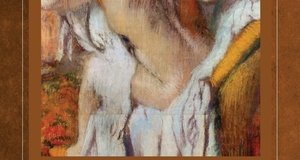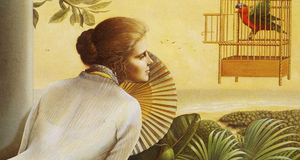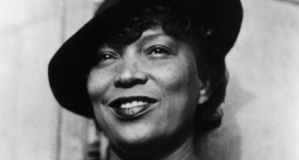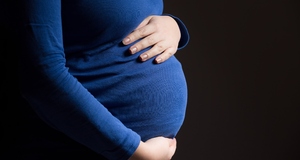Kate Chopin's The Awakening: Struggle Against Society and Nature
By
2012, Vol. 4 No. 07 | pg. 2/2 | « Nature reminds Edna of her position as a mother by making her crave her children’s presence periodically. The first night that she is alone after Leonce’s departure to New York and the children’s to Iberville, “she talked intimately to [the doggie] about Etienne and Raoul” (Chopin 81). Even in her excitement about her freedom, she can’t help but think about her absent children. Then, after confessing her love for Robert out loud for the first time, she is inspired to go to the confectioners and purchase bonbons to send to the children, accompanied by “an abundance of kisses” (Chopin 91). Here, while allowing herself to consider love outside of the confines of her marriage, Edna still thinks of the children and desires to spoil them with treats, reminding them of their mother’s love. Finally, after moving into the pigeon house, Edna feels the desire for her children so strongly that she journeys to Iberville to see them. This much anticipated visit still fails to hold her attention on the boys for long. “All along the journey homeward, their presence lingered with her like the memory of a delicious song. But by the time she had regained the city the song no longer echoed in her soul” (Chopin 105). The constant reminder of her children’s presence in her life brings Edna’s awareness to the natural pull of motherhood on women. The actual process of childbirth is what brings Edna’s realization about motherhood to its full development. Adele summons Edna to keep her company during her accouchement. When Edna arrives at the Ratignolle’s, she finds Adele in the salon, “all her beautiful hair . . . drawn back and plaited. It lay in a long braid on the sofa pillow coiled like a golden serpent” (Chopin 121). This reference to the serpent can allude to two different things. It can be “an image vibrant with suggestions of the natural world—and [Edna’s] sudden aversion to it” (Lattin 43).The other possibility is that the serpent references The Bible, since the serpent was the creature that convinced Eve to commit the original sin. Because of the serpent’s influence, God punishes Eve by vowing, “I will greatly multiply your pain in childbearing; in pain you shall bring forth children, yet your desire shall be for your husband, and he shall rule over you” (Genesis 3:16). Both interpretations make it clear that Edna is beginning to see her role as wife and mother as eternal and inescapable, much like the Kentucky field she describes to Adele. “I could only see the stretch of grass before me, and I feel as if I must walk on forever, without coming to the end of it” (Chopin 19). Nature, in all the forms that Edna encounters it, is powerful, and at the birth of Adele’s child, she begins to find it quite frightening. Adele’s childbirth makes Edna think back on the impact that the births of Raoul and Etienne have had on her life and body. “She recalled faintly an ecstasy of pain, the heavy odor of chloroform, a stupor which had deadened sensation, and awakened to find a little new life to which she had given being, added to the great unnumbered multitude of souls that come and go” (Chopin 122). Because she was drugged during the delivery of both her sons, Edna never truly experienced childbirth. She didn’t realize the overwhelming natural force of bringing a child into the world. When she witnesses the birth of Adele’s child, it is brought to her attention that the female body is designed for childbirth, and she has already committed herself to this purpose by becoming a mother. “Edna is confronted with the painful facts of her gender—because while she may play the man, she is always the woman” (Killeen 423). Her mindset is all wrong for a mother, she sees children as just one more life to populate the world, yet nature has decided that this is her purpose in the world. Edna’s realization about her natural position of woman and mother in combination with the societal position she’s expected to fill drives her to suicide. Adele’s final words to Edna before she departs the Ratignolle’s the night of the birth are, “Think of the children, Edna. Oh, think of the children! Remember them!” (Chopin 122). Adele’s plea invades Edna’s consciousness and becomes the final factor in her decision to leave her current life behind. She has come to realize that “the biological process has created a unity of mother and child, in which the bodily substance of one flows into the other, and thus one larger unit is formed out of two units” (Killeen 429). The concept of sharing her body with another being, becoming truly a part of something other than her individual self, is the opposite of everything that Edna has been looking for. She thinks of how Raoul and Etienne will be a constant presence in her life and how her natural position as a mother prevents her from being able to live a life without them. After all, a woman’s primary job is to bring her offspring to adulthood, and they in turn bring significance to a woman’s life. Edna is unwilling to go about the rest of her life as “Raoul and Etienne’s mother” and “Leonce’s wife.” She knows that to do so would be to give up herself, something she swore she would never do. “The children appeared before her like antagonists who had overcome her; who had overpowered and sought to drag her into the soul’s slavery for the rest of her days” (Chopin 127). Edna will not allow her self to be chained to its natural and societal titles, and she commits suicide to free it from these definitions. In a final statement as to the universality of motherhood, Edna’s acceptance of death is also a rebirth. Nine months have passed since Edna’s enlightening summer in Grand Isle, and her fetus-self is ready to be delivered. “For the first time in her life she stood naked in the open air, at the mercy of the sun, the breeze that beat upon her, and the waves that invited her. She felt like some newborn creature, opening its eyes in a familiar world that it has never known” (Chopin 127). Edna embraces her rebirth to escape the demands of being an adult woman. Children are ignorant of the burdens of procreation and their predetermined societal roles, and Edna longs for this naivety. As she steps into the water, she sheds her obligations, “Like Venus returning to her originary scene, [Edna] descends into the sea, reexperiencing for the last time, her childhood motherlessness, adolescent infatuation, the terrors and exhaustion of womanhood” (Papke 87). Edna lets go of the concerns that nature and society place on a woman by allowing herself to forget her past and immerse herself in death. Nature and society were the two strongest forces attempting to mold Edna Pontellier into the woman that they wanted her to be, but through her suicide, Edna is finally able escape their grasp. Leonce and society owned her soul, telling her to be subservient, to tend house, adore her children and keep up appearances, but it was Raoul and Etienne who imprisoned her body, reminding her constantly of the torture of childbirth that nature requires of her. Nature kept Edna loving her children and declaring that she would give up almost everything for them, but it was her desire for individuality and self-definition that led her to her deathly rebirth. ReferencesChopin, Kate. The Awakening and Other Stories. New York: Oxford University Press, Oxford World’s Classics, 2008. Killeen, Jarlath. “Mother and Child: Realism, Maternity, and Catholicism in Kate Chopin’s The Awakening.” Religion and the Arts. Boston: Brill Academic Publishers, Inc., 2003. 413-438. Lattin, Patricia Hopkins. “Childbirth and Motherhood in The Awakening and in “Athenaise.” Approaches to Teaching Chopin’s The Awakening. Ed. Bernard Koloski. New York: Modern Language Association of America, 1988. 40-46. Papke, Mary E. Verging On The Abyss: The Social Fiction of Kate Chopin and Edith Wharton. New York: Greenwood Press, 1990. The English Standard Version Bible: Containing the Old and New Testaments with Apocrypha. Oxford: Oxford UP, 2009. Suggested Reading from Inquiries Journal
Inquiries Journal provides undergraduate and graduate students around the world a platform for the wide dissemination of academic work over a range of core disciplines. Representing the work of students from hundreds of institutions around the globe, Inquiries Journal's large database of academic articles is completely free. Learn more | Blog | Submit Latest in Literature |


















